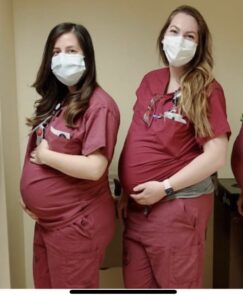Written by Thu Tran, MD,FACOG
August 1, 2021
At the end of March, 2020, our country entered a lockdown phase to prevent the spread of COVID-19. Life stood still, with families huddled in uncertainty of when they would reemerge into their old, normal life. Many obstetricians predicted that nine months later, there would be an explosion of births all around the United Stated. They were all so wrong. The largest decline in births was seen in December 2020, the first month that babies conceived during the beginning of the pandemic were expected to be born.
A recent CDC report showed a continuing declining birthrate in the United States, confirming similar data from the National Center for Health Statistics showing six consecutive years of decline, with a record low of 55.8 births per 1,000 in women aged 15-44. In 2020, there were 4% less births than the previous year. Using data from the Great Recession of 2007-2009 and the 1918 Spanish Flu, and economic studies of fertility behavior, Melissa Kearney and Phillip Levine from the Brookings Institute predicted half a million fewer babies will be born in 2021.
Should you postpone your pregnancy because of the COVID Pandemic? Is it safe to get pregnant and deliver a baby during this time? The first part of the question is personal and in part depends on how much you worry about your financial situation, as Kearney and Levine showed that birthrates in history have been greatly affected by economic events and correlates to a “positive Income effect.”

Many women, however, need to understand the biological clock of fertility. Their wealth and income might fluctuate over their lifetime, but the fertility clock cannot be reversed; it only goes clockwise. The highest fertility rate is in a woman’s 20s, and it decreases steadily, especially from the mid 30s through the 40s. By 40, there’s only 1 in 10 chance that a woman will successfully conceive per menstrual cycle. Older women also face many hurdles in their pregnancy, with higher rates of complications such as diabetes, high blood pressure, and higher risks of having babies with chromosomal and other health problems. Waiting until the end of this COVID pandemic, especially when nobody knows when that end will arrive, might not be the wisest decision for older women.
After gathering data from a year with COVID-19, scientists have concluded that pregnant patients have a higher risk for severe illness with COVID-19, with higher rates of hospitalization, intensive care admission, and a need for ventilators. These patients also have a higher risk of having preterm labor. Babies born with COVID-19, however, have done generally well. Even in babies testing positive for the virus, most have no or mild symptoms and recover. Infection in babies of COVID positive mothers is also uncommon.
So is it safe to plan for a pregnancy during COVID-19 time? I think so, based on what we have learned about how this infection spreads, and how we can use “Best Practice” advice from the experts to avoid the infection.
Current data have repeatedly shown how over the past several months, most of those who died of COVID-19 were unvaccinated. The protective effect of any COVID-19 vaccine should not be a debate anymore, except for those who still see it as a political issue and not a public health issue. In a deadly pandemic, my instinct told me to listen to the scientists and not the politicians, the same way I would not accept an Uber ride from somebody who does not have a driving license or has never driven a car. We will see Darwin’s Law plays out its truth if we listen to the wrong “Healthcare Director” during a deadly viral pandemic. While planning for a pregnancy, a patient should get vaccinated for COVID-19 if she has not done so. It would be her wisest move.
Even after being fully vaccinated, with new COVID-19 variants on the rise, a pregnant woman should keep wearing a mask in public, and should maintain a small, safe social circle. I frankly advise my pregnant patients to avoid unvaccinated people if possible, even when data show a less than 1% COVID-19 hospitalization rate for fully COVID vaccinated people. If the effective rate of Pfizer’s COVID vaccine is 95%, there’s still that 5% chance of getting infected despite the vaccine, symptoms or not.
There are limited data about the safety of COVID-19 vaccine during pregnancy. Clinical trials about the safety and effectiveness of COVID-19 vaccine in pregnancy are underway, although preliminary reports have shown no real safety concern to mothers and babies. The CDC recommends pregnant patients to consider key issues when deciding on receiving COVID-19 vaccination:
—The risk of exposure to COVID-19
—The risks of severe illness
—The known benefits of vaccination
—The limited but growing evidence about the safety of vaccinations during pregnancy
The above issues can be thoroughly discussed with the obstetrician on the first pregnancy visit, if a patient has not been vaccinated for COVID-19.
If you are contemplating a pregnancy, NOW is the best time. You should get vaccinated to avoid potential devastating effects of COVID on a pregnancy you have been yearning for. With some smart planning, common sense and respect for the reliable experts, in this case the bipartisan scientists, you can have a safe pregnancy and delivery.
Tags: COVID, Covid-19 and pregnancy
